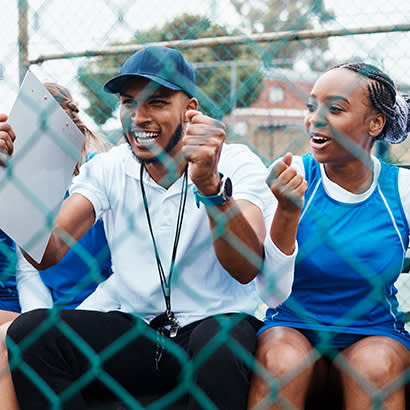
For the first two parts of this blog series, we focused on healthy coaching skills that prioritized the social and emotional learning of youth through sports (read part 1 and part 2). Lastly, we want to focus on diversity, equity and inclusion (DEI) as the final lens that must be present in your youth sports programs and coaching styles to ensure equitable access and positive youth development through sports participation.
DEI training for coaches is important because it helps coaches understand their athletes' diverse backgrounds and experiences, which is essential for supporting adolescents' social and emotional development. Coaches can provide more tailored guidance and support by recognizing and addressing the unique challenges some athletes may face. DEI-focused training enables coaches to foster an inclusive environment where every athlete can participate fully and feel a sense of belonging regardless of race, gender, sexual orientation, religion or socioeconomic background. It helps coaches recognize and address unintentional biases that can affect interactions with athletes.
This understanding is important in preventing discrimination and fostering a positive team culture. DEI training provides coaches with tools to ensure all athletes have equal opportunities to succeed, whether it’s fair playtime, equitable access to resources, or impartial treatment in skill development and leadership opportunities. This helps level the playing field for everyone.
DEI training teaches coaches how to embrace diversity and leverage the strengths and unique perspectives of each individual athlete, fostering collaboration and mutual respect. This not only enhances team dynamics but also improves overall performance. Training in DEI helps coaches interact effectively with people from diverse cultures, navigate cultural differences, communicate effectively, and build relationships with athletes and their families from various backgrounds. Coaches who prioritize DEI in their coaching contribute to broader social change by challenging stereotypes, promoting equity and encouraging inclusivity in sports. By understanding the unique backgrounds and needs of the youth they coach, coaches ensure that participating on a sports team becomes a fulfilling and enjoyable experience that supports each young person's development.
Join us in Atlanta at the “Building Resilience Through Sport” pre-conference workshop at the 2024 NRPA Annual Conference! Youth sports coaches, camp counselors, seasonal staff and community volunteers play an important role in supporting our young people. Please register for this no-cost, in-person workshop by September 20, brought to you in partnership with the Center for Healing and Justice Through Sport (CHJS), Laureus USA and Nike to learn how to build positive environments for youth in your programs – specifically how to apply a healing-centered lens to your coaching style. NRPA Annual Conference attendees should use these instructions for registration. If you are not attending the 2024 NRPA Annual Conference, please use these instructions for registration.
This blog post is the final segment of a 3-part series focused on coaching that utilizes social and emotional learning paired with diversity, equity and inclusion to create a psychologically safe space for youth to participate and gain the benefits of participation in sports. You can read the first two posts here: Part 1 and Part 2.
Charissa Hipp (she/her) is a marketing and engagement manager at NRPA.
Rosa Riley (she/her) is a program specialist at NRPA.


